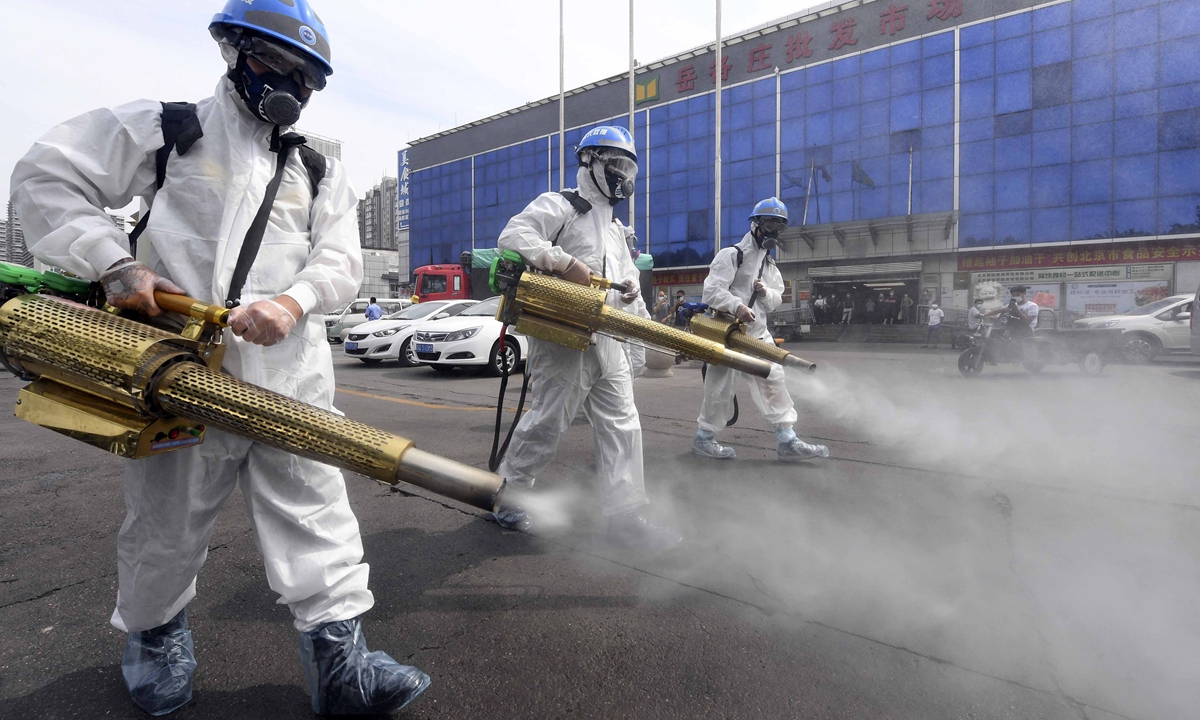Beijing beefs up testing ability
By Zhao Yusha and Cao Siqi Source:Global Times Published: 2020/6/17 21:43:40
‘Can’t impose a lockdown each time an outbreak is reported’

Volunteers from the Beijing Blue Sky Rescue Team spray disinfectant in Yuegezhuang wholesale market in Fengtai district, Beijing. The market is about 12 kilometers from the Xinfadi market, which is linked to the recent COVID-19 outbreak in the capital city. Photo: people.cn
Beijing has conducted nucleic acid tests on 356,000 people since Saturday, said a government official, noting that the city will round up key groups for testing, such as medical workers, those who live around residential compounds where confirmed infected people reside, and teachers and students who have already returned to school.Nucleic acid test, no gatherings, social distancing… Beijingers swiftly raised their guard against the virus contagion after the municipal government raised Beijing's COVID-19 response to Level II. After half a year's virus battle, it seems the panic hovering over Beijing this spring won't return. Instead, Beijingers are exploring ways to try to keep their lives undisturbed while carefully co-existing with the virus.
Zhang Qiang, an official of Beijing's COVID-19 prevention team, said at a Wednesday press conference that six groups should be rounded up for testing, including medical workers, public service sector employees and teachers and students who have already returned to school, community-based frontline workers, alongside workers at the Xinfadi food wholesale market and other related markets as well as residents living in nearby communities.
Beijing is able to conduct nucleic tests for 400,000 people on a daily basis, said Zhang, noting that the city will further expand its nucleic acid testing capacity to meet the increasing demand.
A total of 98 hospitals, disease control departments and third-party institutions will work to ensure orderly and effective testing for residents.
Xu Hejian, a spokesperson for the Beijing municipal government, said on Wednesday that comprehensive screening, nucleic acid testing and home observations should be carried out on those who have had close contact or association with the Xinfadi wholesale market, where the latest COVID-19 outbreak was discovered last week.
Beijing has disinfected 276 farm produce markets and closed 11 underground and semi-underground markets as of Tuesday morning, and 33,173 catering service providers have also been disinfected. The capital city was expected to complete its citywide sanitation of markets and restaurants by Tuesday midnight.
The Global Times reporter learned that food markets and restaurants in Beijing have been racing against time to disinfect, and most of them completed the task on Tuesday. Meanwhile, they were required to complete nucleic acid testing of their staff on Wednesday. If they cannot, they must do so before Thursday.
On the first day that Beijing returned to the Level II emergency response, Li Sai got up very early and took her daughter to the nearby community hospital for a nucleic acid test. Under level II, those who must leave Beijing must obtain a negative COVID-19 nucleic acid test certificate no longer than seven days prior to departure.
To reunite with her husband in Qinhuangdao, two hours from Beijing by high-speed train, Li told the Global Times on Wednesday that she must leave the city quickly before the district where she resides is classified as a medium or high-risk region for the COVID-19. Communities in high risk sub-districts are under lockdown management. No one is allowed to leave.
In subways, shopping mall and restaurants, inspectors were assigned to warn customers to keep a safe distance from each other, and remind them to wear protective gear to prevent infection.
Under Level II, Beijing reinstated closed managements on communities, required people to have their temperatures taken, register with the entrance guards, and check health codes before entering the closed communities. Communities, sub-districts, streets in high/medium-risk areas would ban outsiders and cars from entering; and communities of high-risk sub-districts would have closed-off management, allowing no one to leave.
Mei An, who works at a bank in Beijing, told the Global Times that she supports such targeted control measures. "It seems that we have to co-exist with the virus for a long time. We cannot just impose strict citywide lockdown measures every time an outbreak is reported. The price is too heavy."
Although it did not go as far as Wuhan, some netizens have called Beijing's strict measures a "semi-lockdown."
A Beijing resident surnamed Fan, who stayed in Wuhan since January and returned to the capital in April, told the Global Times that there's a noticeable different between Beijing's level II response to Wuhan's lockdown.
"Compared to the initial chaos in Wuhan, which was generated by ignorance of the virus, Beijing's virus battle is more orderly. It only targets high-risk areas, and swiftly and effectively screens people related to those places," Fan said, noting that he is confident in Beijing's capability to bring the outbreak under control in a short time.
Some foreign media, such as Financial Times, reported that China did not impose a full lockdown out of political concerns.
Wang Guangfa, a respiratory expert at Peking University First Hospital, dismissed such a suggestion, saying Beijing's response measures are in line with the city's situation. "China sealed off Wuhan because we had little understanding of the virus back then. The fact that there were other infection cases found outside Huanan wet market, where the outbreak was first reported, suggests that there was sustained community transmission in the early stages."
"But Beijing is different, as all infections are connected to Xinfadi market, which means it is still a confined outbreak," said Wang.
Wang said that the next few days are important. "Beijing's virus prevention effectiveness will surface 14 days after the measures were taken… if there are no infections for two incubation periods (28 days), the prevention measures are likely to be loosened."
Posted in: SOCIETY,FOCUS